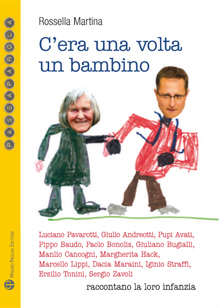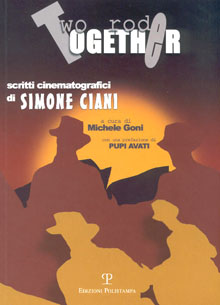Ricerca Veloce
Ricerca Avanzata
chiudi

Pupi Avati
Giuseppe Avati detto Pupi nasce a Bologna il 3 novembre 1938, da famiglia borghese. Dopo aver frequentato la Facoltà di Scienze Politiche, s’impiega in una ditta di surgelati e nel tempo libero s’appassiona al jazz, divenendo musicista dilettante.
Nel 1968 debutta nel lungometraggio con Balsamus, l’uomo di Satana, curiosa fusione di gotico e grottesco assolutamente atipica per la cinematografia italiana del tempo: confermerà la sua vocazione verso storie irreali nel successivo Thomas (1969), rimasto inedito in Italia, e nel singolare La mazurka del barone, della santa e del fico fiorone (1974), ove la narrazione assume toni favolistici che vagamente ricordano l’universo felliniano.
Nel 1975, il bizzarro fantamusical Bordella gli procura non pochi problemi con la censura, mentre l’anno dopo dirigerà, con La casa dalle finestre che ridono, un insuperato film del mistero d’ambientazione padana, del quale il seguente Tutti defunti… tranne i morti (1977) costituisce una variazione noir-ridanciana.
È poi la volta di due sceneggiati televisivi di grande successo, Jazz band (1978) e Cinema!!! (1979), cuciti con l’esile filo d’un autobiografismo che assume i colori del ricordo e della nostalgia: tematiche, queste, ch’egli riprenderà nella fiaba de Le strelle nel fosso (1979), nella garbata rievocazione inizio secolo de Una gita scolastica (1983), nella messa in scena d’una pagina dell’adolescenza mozartiana in Noi tre (1984), nell’amara parabola di Festa di laurea (1985), e – in epoca più tarda, con minore ispirazione – in Storia di ragazzi e ragazze (1988) e Dichiarazioni d’amore (1994).
Tra i suoi lavori più riusciti vanno ricordate anche le incursioni nella contemporaneità di Impiegati (1985), Regalo di Natale (1986), Ultimo minuto (1987): vicende amare, spesso crudeli, nelle quali prevale un tono dolente e scorato.
Meritano segnalazione inoltre il bellissimo horror Zeder (1981), il biografico Bix (1990), il medievale Magnificat (1993) ed il gotico L’arcano incantatore (1997), oltre all’ambiguo thriller L’amico d’infanzia (1994).
Gli ultimi suoi lavori sono Il testimone dello sposo (1997), La via degli angeli (1999), I cavalieri che fecero l’impresa (2001), tratto da un suo romanzo, ed il tenero e crudele Il cuore altrove (2003).
Giuseppe Avati known as Pupi was born in Bologna on November 3, 1938, to a middle-class family. After attending the Faculty of Political Science, he became employed in a frozen food company and in his spare time became passionate about jazz, becoming an amateur musician. In 1968 he made his feature film debut with Balsamus, the man of Satan, a curious fusion of gothic and grotesque that was absolutely atypical for the Italian cinematography of the time: he would confirm his vocation toward unreal stories in the following Thomas (1969), which remained unreleased in Italy, and in the singular La mazurka del barone, della santa e del fico fiorone (1974), where the narrative takes on fabulous tones vaguely reminiscent of Fellini's universe. In 1975, the bizarre fantamusical Bordella got him no small amount of trouble with the censors, while the following year he would direct, with The House with the Laughing Windows, an unsurpassed mystery film with a Po Valley setting, of which the following Tutti defunti... tranne i morti (1977) constitutes a noir-ridan variation. It was then the turn of two highly successful television dramas, Jazz band (1978) and Cinema!!! (1979), stitched together with the slender thread of an autobiography that takes on the colors of memory and nostalgia: themes, these, which he will take up in the fairy tale of Le strelle nel fosso (1979), in the polite turn-of-the-century evocation of Una gita scolastica (1983), in the staging of a page of Mozart's adolescence in Noi tre (1984), in the bitter parable of Festa di laurea (1985), and - later, with less inspiration - in Storia di ragazzi e ragazze (1988) and Dichiarazioni d'amore (1994). Also worth mentioning among his most successful works are the forays into the contemporary in Employees (1985), Christmas Gift (1986), and Last Minute (1987): bitter, often cruel affairs in which a sorrowful, despondent tone prevails. Also worthy of mention are the beautiful horror Zeder (1981), the biographical Bix (1990), the medieval Magnificat (1993) and the gothic The Arcane Enchanter (1997), as well as the ambiguous thriller The Childhood Friend (1994).His latest works are The Bridegroom's Best Man (1997), The Way of Angels (1999), The Knights Who Did the Deed (2001), based on one of his novels, and the tender and cruel The Heart Elsewhere (2003).
Vedi anche...
C’era una volta un bambino
- € 7,65
- € 9,00
Two rode together
- € 11,90
- € 14,00

